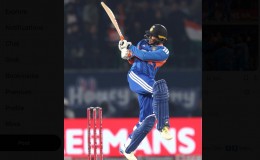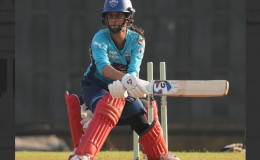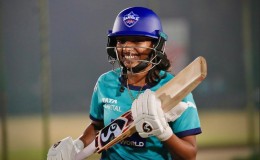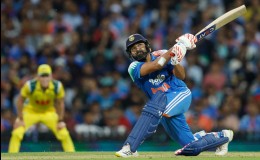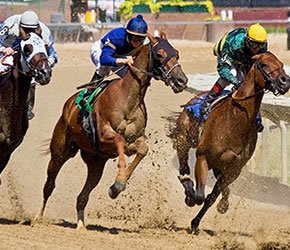 There can't be a more realistic sight depicting the majesty of a horse than to spend an afternoon at a race course where these equestrians compete with each other on their jockeys' command for the honour and glory of their owners. It's a sight to behold. A sight which reminds us of the power and speed of a horse, a projection of peoples' dreams -- strong, powerful and beautiful -- that has the capability of giving us an escape from our mundane existence.
There can't be a more realistic sight depicting the majesty of a horse than to spend an afternoon at a race course where these equestrians compete with each other on their jockeys' command for the honour and glory of their owners. It's a sight to behold. A sight which reminds us of the power and speed of a horse, a projection of peoples' dreams -- strong, powerful and beautiful -- that has the capability of giving us an escape from our mundane existence.
But then there goes a lot into preparing these mute animals for a race which is harder than upbringing a child and even harder to prepare them further into a potential athlete. Indian Sports News made a deliberate effort to look into the kind of training and preparation that go into making potential winners out of these horses and discovered some strange and unfamiliar facts during its one-week observation at the Delhi Race Club.
Everybody from a trainer, to a jockey to a syce (caretaker of a horse) have different roles to play in making a potential winner out of a young horse. Assessing a horse's strengths and weaknesses is a constant challenge, while juggling their fitness and training is time consuming. It requires a lot of patience. Getting a horse prepared for their first career start can be one of the most challenging aspects of training--the real test of which lies with the trainer.
First and the most important task before an owner and a trainer is to choose a horse from a horse stud farm, says K Ali Khan, trainer at the Delhi race Club since the last 35 years. "Horses are bought from stud farms. The cost of the horseusually, range from Rs 50,000 and goes up to Rs 60 lakh, depending upon their pedigree (lineage of their parents). A newly-born horse generally weighs 60 kg. They are then de-wormed to save them from future stomach ailments. After then we start feeding them and make them healthy. Their food includes oats, grass, gram, barley and fruits. A variety of colours in horses like chesmic, grey, bay, chestnut and others can be found," he explains.
Then start their practice sessions, which prepare them for the big day. There are different practice plans for different horses, depending upon their strength and capabilities to learn. "A horse's day starts with launching, followed by exercise to develop their muscles. Then comes trotting and cantering. For all horses the schedule goes as follows: Morning track work for 2.5 hrs, days work includes roll, trotting, cantering. Cantering involves categories such as slow canter, canter, open canter, half pace, three quarter pace and full speed," informs K Ali.
After this the syce -- man who takes care of the horse-- cleans and massages their horse's body to remove unwanted hair. "After the massage, comes the feeding part. We know which fruit and food our horse likes. So we make sure that we provide it to them. To make them relax we take them for sand bath, which they enjoy the most. We also take them for walk in the evenings. They are just like a child to us. In the evening again, we follow with the same process as that in the morning," says Dukhan Pasman, a syce.
The horse surely puts in a lot of effort to be a jubilant winner at last, but equally important is the hard work of their trainer and the jockey that goes into the process.
"Training a young horse is very difficult. They are like children who can't talk. So we have to get accustomed to their behaviourial patterns. If he stops while practicing, we have to talk to them politely and explain them. There are bound schools for these horses according to their age. You can associate the process with the transformation of a school going student to the one who has reached the university level. And what's interesting is that they also make friends here, unlike any other human being. And it really helps. When they don't agree to enter the racing rink, they follow their other friends at times, which makes it easy for us," says SP Singh, one of the trainers.
A trainer's role is all more important as besides charting out the training sessions for the horses, they have to understand the problems that a horse faces. "If the bones of a horse are weak or he is not eating, we have to know the reason behind it. Experienced trainers are kept for young horses as they are patient and understand their psychology the best. It's very important to talk to the horses. It takes almost six months to prepare a horse for race," says M. Ehsaan, another trainer at the DHC.
But even the experienced and trained horse can be a mischief. They might not agree to enter the rink just before the start of the race. "Main is the starting gate. If the horse refuses to enter then everything goes in vain. We have to change thehorse's mind psychologically. We blindfold them and make them enter the rink. After that we lock the gate. Sometimes we block both sides with blinkers so that it does not get disturbed by external forces. Sometimes the horse jumps over the rink besides doing so much. Such behaviour is worrying for the trainer as all the hard work can go in vain after such a long training. So we have to deal with all this wisely," says Abdul Ali, trainer.
Equally important are the jockeys--horse riders--who have to follow the instructions of their trainer and tame the horseas told. "Jockeys play an important role in horse racing as it's them who have to lead the horse. It's them who have to read the horse's psychology during practice sessions and during the races. To choose a right jockey for a horse is the trainer's task. Lot of things have to be considered for choosing a jockey for a particular horse. A jockey's weight matters. The one who is 48 kg can ride on other horses, but the one who is 60 kg can only ride one (that's what called handicapping a horse).To become a professional jockey, the procedure is that you start being a riding boy. Then you advance to the level of an apprentice jockey and eventually a pro jockey," said Dhanish, a riding boy.
The oldest trainer at Delhi race course, SR Chauhan says, "Ye dariya-ey ilm hai (To understand horses is difficult). There are trained jockeys to understand the mind of a horse. There are certain tests for jockeys which are compulsory to pass. Jockeys are selected through the records of certain races as well. If jockeys are found misbehaving with horses or seen indulging in any malpractice, they are fined and suspended for a certain period of time. They can also be taken to court for all this. But it all depends on the stipendiary stewards how to deal with the situation."
"A jockey can make the horse win or lose the race if he wants," he added.







